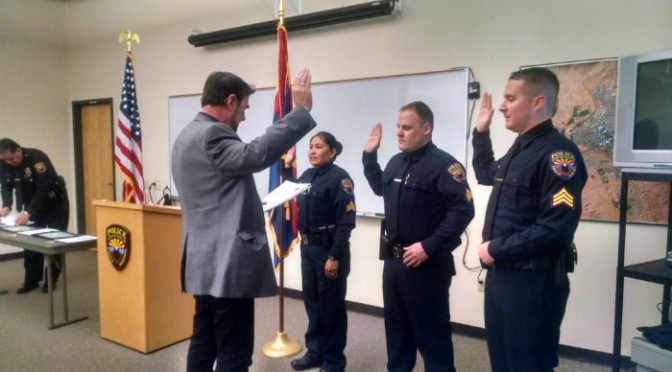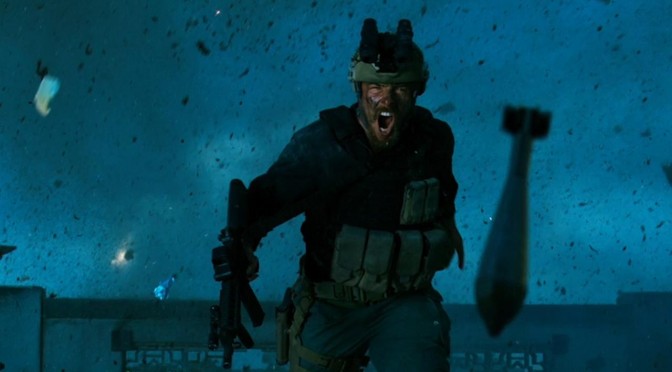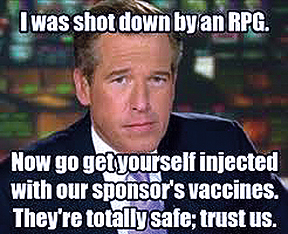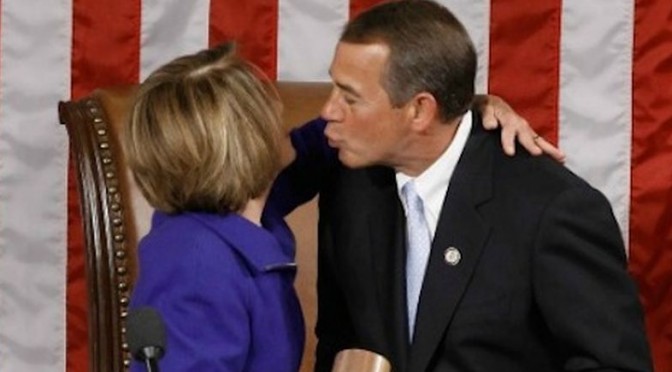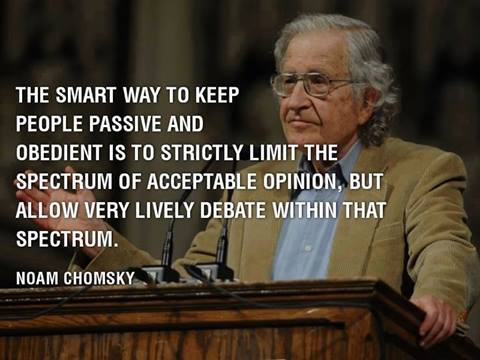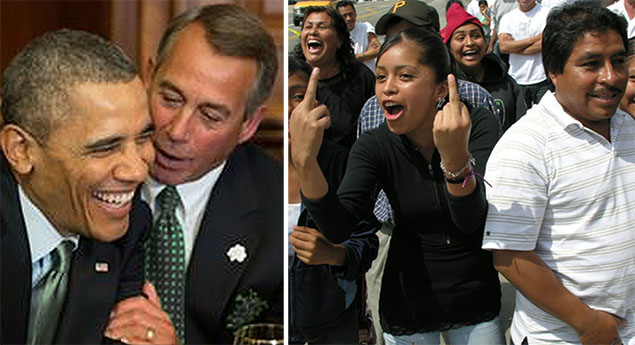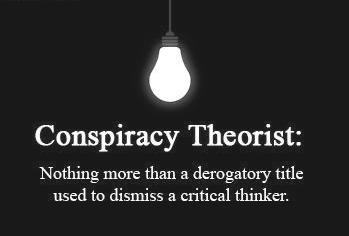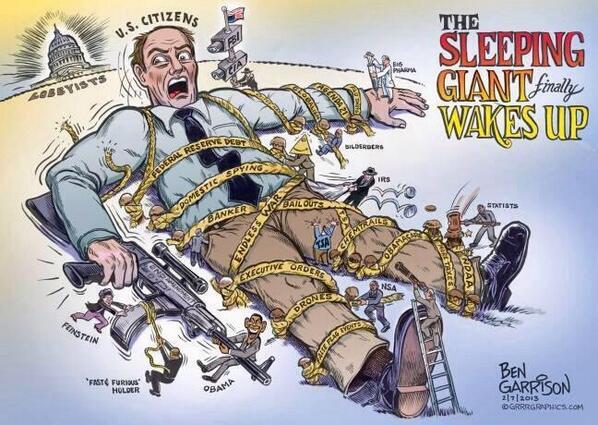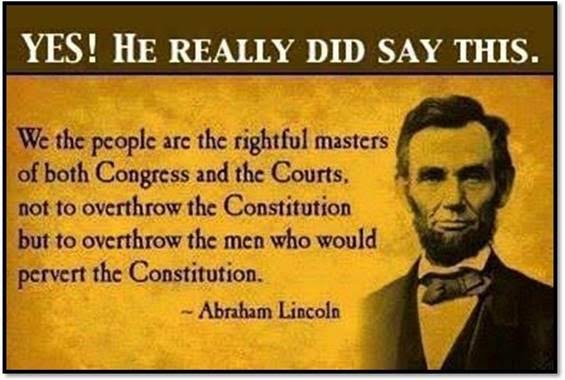Jacob Hornswoggler ended the call on his cell phone as he strode through the automatically opening doors of the GBS building. His wife had called him with a minor emergency. She fell in love with a pair of dress gloves and paid a few hundred for them, only to find out they didn’t fit her hands. Hornswoggler assured her he would come up with a solution; but for now he had other matters to deal with.
The world owed an unpayable debt of gratitude to people like Jacob Hornswoggler. The Generic Broadcast Service was making the world a better place thanks to his vision and tireless vigilance.
Still, viewership of his network—especially the news programs—wasn’t as high as it should be. Of course the quota of loyal watchers had nothing to do with anything as evil as profits. It was merely established to ensure that voters citizens were adequately conditioned informed. This was the purpose of Jacob Hornswoggler’s visit to the video editing suites today.
An atmosphere of impartiality settled over the network’s headquarters when this paragon of journalistic integrity graced the multimedia conglomerate’s loyal footsoldiers with his presence.
Hornswoggler stopped by an editing room with an open door and stepped inside. A pimple-faced 20-something from Tarnation University nodded a reverent greeting.
“How’s the homicide beat?” Hornswoggler asked.
“I’m going through the list,” replied his employee. “Trying to find what to lead with.”
Hornswoggler tactfully snatched the list out of his employee’s hands and pored over it with his experienced eye.
Well, he actually used his less experienced eye, too.
“Hmm,” he intoned, “Muggers kill unarmed victims in Detroit; Fast and Furious hit on Border patrol agent; muggers kill unarmed victims in Chicago; rapist rapes and murders unarmed victim in New York…ah, here’s one: a prominent politician’s lawyer found dead from a gunshot wound to the back of the head.”
The employee rubbed his head uncomfortably. “Um, the prominent politician is a Democrat up for reelection.”
“Obviously a suicide,” Hornswoggler said, and continued thumbing through the pages.
“That Weinburg murder could be sensational,” suggested the employee.
Hornswoggler shook his head and frowned. “Come on, now, get with the program. We don’t run same-sex gang rape/murders. They foment an attitude of fear and contaminate the whole gay rights debate. Not to mention influencing the Boy Scouts’ upcoming vote.”
“The Boy Scouts’ upcoming vote?”
Hornswoggler frowned. “I said: ‘not to mention the Boy Scouts’ upcoming vote.’ Can’t you follow simple instructions?”
The employee blushed and said, “Sorry, sir. I must be crashing from the Red Steer. It’s just that we led with the Peter Puffer murder for all those weeks in a row. I thought homicides involving gays were a priority…”
“Gays are victims!” Hornswoggler snapped. “What are you—a closet homophobe?”
“Of course not!”
Hornswoggler glared at him for a moment, then resumed scanning over the list. “Hmm. What do we know about this homicide in Swampfill, Florida?”
The employee shrugged dismissively. “Not very useful.”
“Well, the victim was from the appropriate victim class…play the 911 tape.”
The employee summarized while cuing up the recording, skeptically. “Jerry Lipschitz was being a proactive Neighborhood Watch patrol person. Throdown Moerage freaked out, attacked him. Lipschitz shot him.”
“Gun violence!” Hornswoggler growled, already fuming at the inherent evil of firearms in the hands of American citizens. The only people who should be allowed to keep and bear arms were federal agents and Mexican drug lords.
The employee turned up the volume. The voice of a police dispatcher asked, “Can you describe what he looks like?”
Lipschitz replied, “About six-three, muscular, wearing a hoodie…”
“Is he white? Black? Hispanic?” asked the dispatcher.
“I think he’s black,” Lipschitz said.
Hornswoggler reached past his employee and stopped the recording, eyes gleaming with journalistic integrity. “We lead with this: racial profiling leads to senseless racially-motivated murder by Christian right-wing gun nut! Edit out the part where the dispatcher asked him about ethnicity, or the audience will miss the racial motivation angle.”
The employee squirmed. “But, um, Lipschitz is a minority, too.”
Hornswoggler stroked his chin. “He’s not an undocumented worker, is he?”
“No. He’s a US citizen.”
“Alright. We can work with this,” Hornswoggler said, too filled with the proper indignation to let this story go untold.
The employee still didn’t like it. “But Lipschitz is, like, Jewish and Puerto Rican or something.”
“Hmm. Jewish Nazi?” Hornswoggler mused, then shook his head. After many years of covering the Middle East, he still couldn’t get that label to catch on.
“You can tell he’s Latino by looking at him.”
“He’s a white Hispanic,” Hornswoggler declared. “Emphasize that.”
“White Hispanic? Is there such a thing? I’ve never heard of that.”
“Don’t fear change,” Hornswoggler encouraged. “But don’t show his photo too much. Show Throdown—but find some Farcebook pictures of him when he was 12 or younger. We owe it to the public to show his vulnerability.”
“I’m on it,” the employee said.
Jacob Hornswoggler nodded and proceeded to the next door. An obese, androgynous editor from Smithereens State occupied this room.
“How are we doing here?”
The employee grimaced and sighed heavily. “It’s hard to find any real news stories amidst all the whining about unwarranted federal wire tapping, use of the IRS to harass and intimidate political opponents, and indefinite detention without trial.”
“Crybabies are everywhere,” Hornswoggler agreed, rolling his eyes with an enlightened scoff. “To hear them tell it, you’d think that abuses of power are just as wrong under this administration as they were under the previous one.”
They both shared an exasperated shake of the head. Despite all their valiant effort to educate, some Neanderthals just couldn’t grasp the complexities of relative standards.
“Here’s what we’ll do,” Hornswoggler said, drawing on his bottomless supply of conflict resolution savvy. “Let’s put together a special report on executive tyranny—which can certainly be a bad thing, you see. Make it hard-hitting, relevant and timely. We’ll call it ‘Looking Back on Watergate’.”
Their exchange of mutually supportive harrumphs were interrupted by a text from Hornswoggler’s wife.
Have you come up with a resolution about the gloves?
The gloves, the gloves. What could be done about a brand new pair of gloves that were the wrong size? He pulled the receipt from his pocket and flicked it with his thumb thoughtfully.
Jacob Hornswoggler was still mulling over this dilemma when he entered the next room.
“Why the long face?” he asked, noticing the dour expression worn by his economic analyst from Sam Hill College.
“I just can’t figure out a way to present these numbers,” the employee replied. “Not in a way that will reflect the superb national leadership we now have.”
Hornswoggler patted his employee on the shoulder. “It’s challenging, but not impossible. First of all, don’t include people who are still jobless but have used up all their unemployment benefits. Put it on a fancy bar graph and call it ‘unemployment statistics,’ just don’t explain that you’re only counting the fraction of unemployed people who are still getting unemployment checks.”
“But I’ve done that, sir,” the employee said, dejected. “The figures are still worse than ever.”
Hornswoggler stroked his chin. “Hmm. Well, remove the state of California from the report. Then re-run the numbers and show a clip of the president blaming the previous administration for the economy.”
Well, that certainly wouldn’t be difficult to find. The employee began to feel a little better. But that wouldn’t fix everything.
“Um, sir,” the employee said, tentatively. “We still have a problem.”
Hornswoggler raised his index finger. “No we don’t. The economy is in its best shape ever. Remember: as of Inauguration Day, the recession became a ‘slow economic recovery.’ Slow because of the previous administration, of course.”
“Um, what I mean is, sir: things like gas prices.?”
“Gas prices?” Hornswoggler boomed. “What about gas prices? People shouldn’t be driving personal vehicles anyway! Everyone should use public transportation…except people in critical positions, of course, such as myself.”
“Well, see sir, during that previous administration, when prices were a buck-seventy a gallon, we kind of blamed it on them, because they had no sympathy for the little guy.”
“They didn’t,” Hornswoggler said. “They were hopelessly out-of-touch—a bunch of cold-hearted elitist pigs who couldn’t care less about poor working class people getting gouged at the pumps!”
“Well,” the employee continued, nervously, “gas prices are now three-fifty a gallon.”
Hornswoggler pshawed. “Just don’t mention gas prices. You just show those jobs figures. Hoo, boy, what an impressive employment graph that will be!”
“Well, the reason…um, I’m not real confident,” the employee said, “is that some bloggers kept records of what we said then, and are comparing it to our silence now.”
Righteous outrage coursed through Jacob Hornswoggler’s body. How dare those amateurs! He was sure this was a violation of his rights, somehow. They should be prevented from spreading their vile hatred amongst the working class morons out there, who were sure to draw the wrong conclusions if exposed to such unregulated vitriol.
“Find out who these bloggers are and expose them as racists,” he said.
His employee couldn’t help but swell with pride for being under the inspired tutelage of a visionary genius like Jacob Hornswoggler.
The entire GBS building glowed with an aura of journalistic objectivity.
Before Hornswoggler made it to the next room, his cell phone rang. He smiled, thinking it was his wife…but then noticed the number was the Virtual Hotline straight from the Capitol.
“This is Jacob Hornswoggler,” he intoned, voice rich with the nuances of his ethical supremacy.
“We have a Level Three emergency,” the voice on the phone said. “We need you to come in immediately.”
“On my way,” Hornswoggler said, striding toward the door.
Level Three was bad. It meant the March of Progress was being threatened and required a swift, vehement response.
But there was a silver lining in this dark cloud: during the limousine ride to his personal jet, Jacob Hornswoggler played with the glove receipt and smiled through the tinted windows at the sign over the store where the gloves were bought as the limo drove past.
Jacob Hornswoggler knew exactly what to do about the ill-fitting gloves. It was so simple, he should have thought of it from the start…but the rigors of his job must have distracted him. The answer was staring him right in the face the entire time!
All he had to do was make a call to some doctors he knew and have them surgically alter his wife’s hands to fit the gloves.
At various locations around the globe, certain individuals received the Level Three Emergency call, and had to interrupt their important work for an impromptu trip to the White House.
This was Chapter 3 of The Greater Good.

